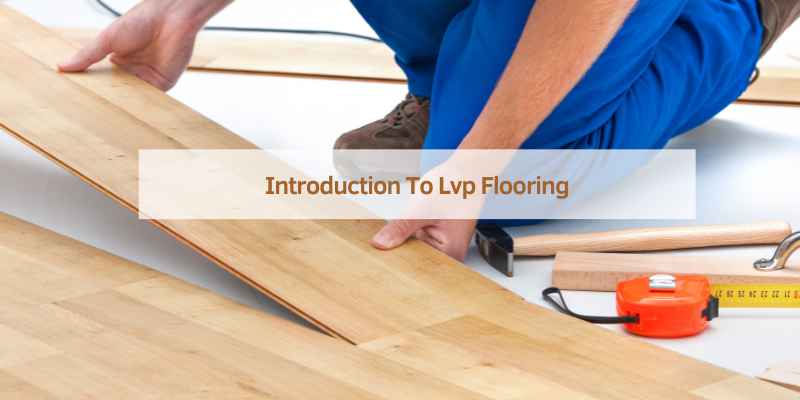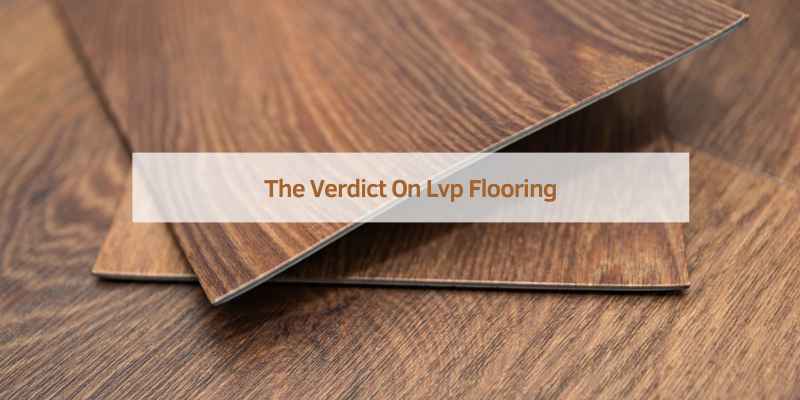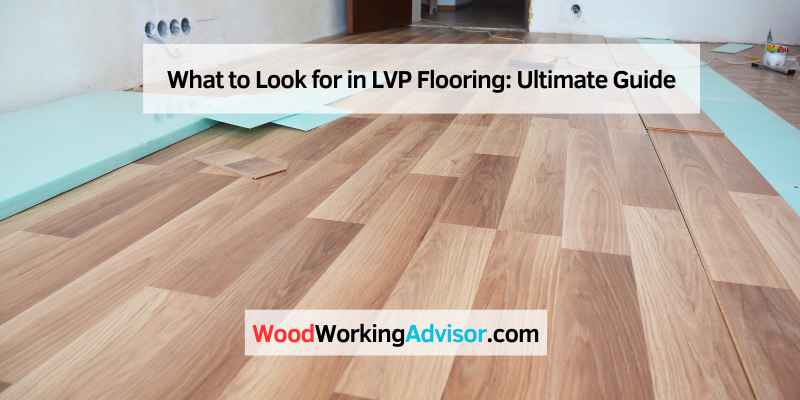Look for durability, water resistance, and realistic design in LVP flooring. Consider ease of installation and maintenance.
Luxury Vinyl Plank (LVP) flooring has become popular for its versatility and aesthetic appeal. Homeowners appreciate its ability to mimic natural wood or stone while offering superior durability. LVP flooring resists water, making it ideal for kitchens, bathrooms, and basements.
Easy installation options, such as click-lock systems, save time and reduce labor costs. Maintenance is simple, requiring only regular sweeping and occasional mopping. Whether updating a single room or renovating an entire home, LVP flooring provides a cost-effective solution without compromising style or function. Consider these factors to ensure a wise investment in your home’s flooring.
Introduction To Lvp Flooring
LVP flooring is becoming very popular. Many people love its look and feel. It is affordable and durable. Homes and offices both use LVP flooring. It can mimic wood and stone. Installation is easy and quick.
LVP flooring is made of vinyl. It comes in planks. Each plank looks like real wood or stone. LVP is water-resistant. It is great for kitchens and bathrooms. Cleaning it is simple. Just use a mop or cloth. Scratches are rare, making it ideal for homes with pets.

Material Quality
Luxury Vinyl Plank (LVP) flooring comes in different types. Solid vinyl core is one type. Wood-plastic composite (WPC) is another type. Stone-plastic composite (SPC) is also available. Each type has its own benefits. Solid vinyl core is durable and water-resistant. WPC provides comfort underfoot. SPC is very strong and stable.
The wear layer is very important. It protects the floor from scratches. A thick wear layer means more protection. Look for a wear layer that is at least 12 mils thick. 20 mils or thicker is best for high-traffic areas. The wear layer also helps the floor last longer. It keeps the floor looking new.
Design And Aesthetics
LVP flooring comes in many patterns and textures. Some floors look like real wood. Others look like stone or tile. This variety helps you find the right look for your home. Textures can be smooth or rough. Some floors even have a grainy feel. This makes them feel more like real wood. You can choose what fits your style best.
It is easy to match LVP flooring with your home decor. You can find floors that fit any room. Light floors make rooms look bigger. Dark floors add a cozy feel. Some floors have bright colors. Others are more neutral. This means you can find the perfect match for your furniture. Always consider your room’s style and colors. This way, your floor will look great in your home.
Durability Factors
LVP flooring is known for its scratch resistance. It can handle daily wear and tear well. Kids and pets won’t damage it easily. Impact resistance is also a key feature. Dropping items won’t cause major issues. This makes it perfect for busy households.
Water resistance is crucial for LVP flooring. It can withstand spills and splashes without damage. Moisture resistance prevents warping. This makes it ideal for kitchens and bathrooms. Cleaning is easy and hassle-free.
Comfort And Insulation
Lvp flooring often feels soft underfoot. This makes it comfortable to walk on. Some types have a cushioned backing. This adds extra comfort. Families with kids and pets will love this feature. Standing for long periods can be more bearable with this flooring.
Lvp flooring helps keep rooms warm. This can save on heating bills. It also reduces noise levels. This makes homes quieter and more peaceful. Some types are better at this than others. Check for thermal and sound ratings before buying.
Installation Considerations
LVP flooring is known for its easy installation. It often uses a click-lock system. This system helps the pieces snap together. You don’t always need glue or nails. This makes the job simple. Even beginners can do it.
LVP flooring can go over many types of subflooring. It works well on concrete, plywood, and even existing vinyl. This makes it very versatile. Always check the subfloor is clean and dry. This helps the LVP to last longer.
Maintenance And Upkeep
Lvp flooring is very easy to clean. Use a vacuum or a broom to remove dirt. A damp mop can be used for deeper cleaning. Avoid using harsh chemicals as they can damage the floor. Spills should be cleaned immediately to prevent stains. For sticky spots, a mild soap solution works well. Make sure the floor is dry after cleaning to prevent slips.
Protect your floors by using furniture pads. This prevents scratches. Use rugs or mats in high-traffic areas. Regular maintenance extends the life of your floor. Avoid direct sunlight to prevent fading. Rearrange furniture occasionally to prevent dents. Keep pet nails trimmed to avoid scratches. With proper care, Lvp flooring can last many years.
Environmental And Health Impact
LVP flooring can be eco-friendly. Look for brands that use recycled materials. Some LVP floors are made with sustainable practices. These choices help reduce waste. Eco-friendly floors are good for the planet.
Indoor air quality is important. Some LVP floors have low VOCs. VOCs are chemicals that can harm health. Low VOC floors are better for indoor air. Good air quality keeps your family safe.
Cost Vs. Value
Evaluate durability and aesthetics when selecting LVP flooring. Consider maintenance needs and price for optimal value. Prioritize quality materials to ensure long-lasting performance and appeal.
Price Range Of Lvp Flooring
LVP flooring costs between $2 to $7 per square foot. This price is for materials only. Installation adds extra costs. Professional installation ranges from $1.50 to $6 per square foot. DIY installation can save money but needs time and skill. High-end brands cost more but offer better quality and durability. Budget options are available but may not last as long. Choosing the right balance of cost and quality is crucial.
Return On Investment
LVP flooring can increase home value. Buyers look for durable and stylish floors. LVP is water-resistant and easy to maintain. These features make it attractive. Homes with good flooring sell faster. Investing in quality LVP can provide a good return. Consider long-term benefits over initial costs.
Warranty And Brand Reputation
A good warranty is very important. Check the length of the warranty. Longer warranties often mean better quality. Read the fine print to know what is covered. Some warranties cover only specific issues. Understand the terms and conditions before you buy. This will help you avoid surprises later.
Choose brands with a good reputation. Well-known brands often offer better products. Read customer reviews online. Reviews can tell you a lot about a brand. Ask friends and family for their recommendations. Trusted brands usually have good customer service. Check for certifications and awards. These can be signs of a reliable brand.
The Verdict On Lvp Flooring
LVP flooring is very durable. It can withstand heavy foot traffic. This flooring is also water-resistant. Spills and splashes are not a problem. LVP flooring is easy to clean. A simple mop and broom will do the job. The cost is budget-friendly. It looks like real wood. Many colors and styles are available. It is softer underfoot than tile.
Some cons to consider. It can dent with heavy objects. Sunlight can fade the color over time. Installation can be tricky for beginners. It may need professional help. LVP flooring is not as warm as carpet. It can be cold in winter.
Think about your needs. Consider the pros and cons. LVP flooring is good for kitchens and bathrooms. It is also good for living rooms. Choose a style you like. Make sure it fits your budget. Ask for samples before buying. Read reviews from other buyers. Talk to a flooring expert if unsure.

Frequently Asked Questions
What Should I Look For When Buying Lvp?
Look for durability, wear layer thickness, water resistance, and realistic appearance. Check for ease of installation and maintenance. Ensure a good warranty.
How Do I Know If My Lvp Is High Quality?
Check for a thick wear layer, high-density core, and UV-cured coating. Look for warranties and certifications. Read customer reviews.
What Thickness Of Lvp Is Good?
A good thickness for Luxury Vinyl Plank (LVP) is 4-6mm for residential use. For high-traffic areas, 8-12mm is ideal.
What Type Of Lvp Is Best?
Luxury Vinyl Plank (LVP) with a thicker wear layer, such as 20 mil, offers the best durability and performance. Choose waterproof LVP for moisture-prone areas like kitchens and bathrooms. Opt for brands with good customer reviews and warranties for added peace of mind.
Conclusion
Choosing the right LVP flooring can transform your space. Consider durability, style, and ease of maintenance. Pay attention to thickness and warranty for long-lasting results. With these tips, you’ll find the perfect LVP flooring to enhance your home. Make your flooring choice wisely for a beautiful and functional space.


